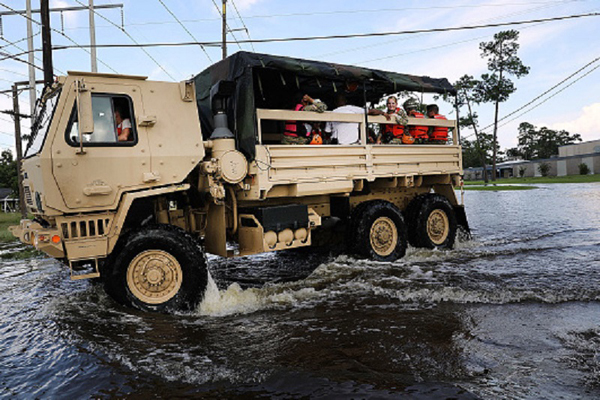- Fragile Planet Offers a Nighttime Wildlife Experience
- Falcons Soccer Off & Running
- Cameron County Receives Funds to Improve Two Parks
- Falcons Complete First Half of 32-6A
- School District to Help out Victims of California Wildfires
- Sand Castle Days Continued Despite Unexpected Weather
- Ready for District
- Discussion of Garbage Dumpster Rates, Agreements Between State & City on Highway Regulations, and More
- 31st Annual Shrimp Cook-Off is Right Around the Corner
- LFHS Cross Country
Credit Agency Warns Cities to Prepare for Climate Change
- Updated: December 15, 2017

Many scientists believe the heavy floods that accompanied Hurricane Harvey last summer were caused, in part, by climate change. Photo: Platt/GettyImages
by Mark Richardson
HOUSTON – Municipal officials could be forced to deal with climate change sooner rather than later, or have their bond ratings downgraded.
Moody’s Investor Services, a bond rating agency, says one element of how it now will determine a city’s credit rating in Texas and across the country will be to assess their risk from climate change, and whether they are preparing to deal with the problem.
Ratings from Moody’s help determine interest rates on bonds issued by cities to fund roads, buildings and other civic projects.
Shana Udvardy, a Climate Preparedness Specialist with the Union of Concerned Scientists, says coastal cities will have to make some tough decisions as sea levels rise.
“Cities can defend against the sea, they can also accommodate and learn to live with the water, and then the harder choice is thinking about having neighborhoods or communities retreat from areas that are too hard to live in anymore,” she says.
Moody’s identifies Texas, Florida, Georgia and Louisiana as the states most at risk for damage from climate change, although almost every state will be affected. The agency says it will assess both a city’s risk from climate trends, a shift over several decades, and climate shock from extreme weather events such as natural disasters, floods and droughts.
Udvardy says the Texas coast already is seeing both short- and long-term risks from rising seas.
“Today, the Bolivar Peninsula is seeing 11 percent of their useful land being flooded by sea-level rise 26 times per year,” she adds. “This number jumps to 26 communities in the ‘high scenario’ in 2100.”
She says while some politicians deny that the results of climate change are human-caused, the threat of a bad bond rating will likely make it more difficult for them to disregard the problem.
“You can’t ignore the floodwaters lapping at your house or your doorstep,” states Udvardy. “So, it doesn’t matter necessarily whether those political leaders are saying how it is caused. As long as they are acting to put protective measures in, they’ll be rewarded by protecting their communities.”
Good bond ratings are important because when financing large municipal projects, even a small change can cost a city’s residents millions of dollars on their annual tax bills.
